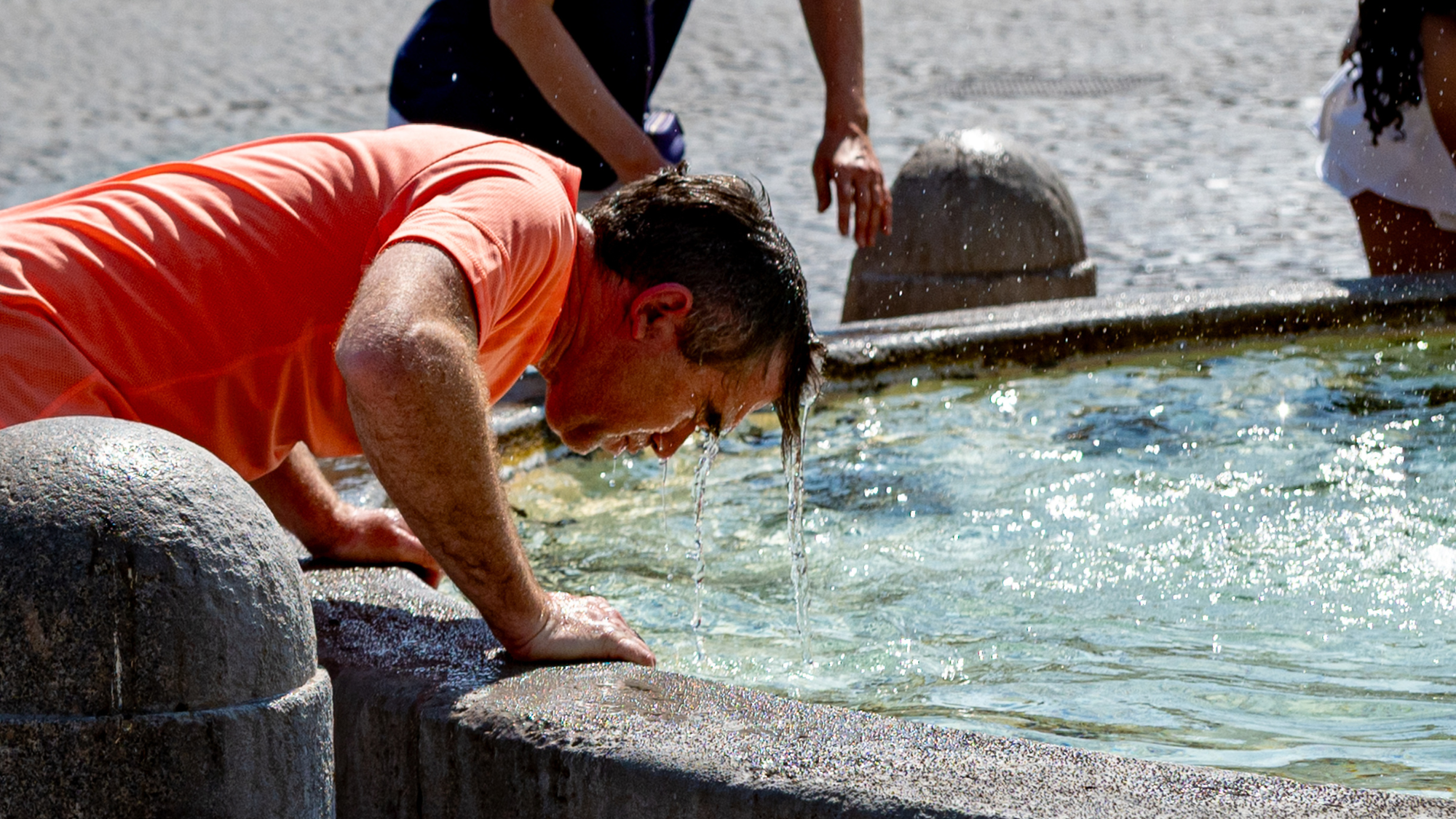Europe's heatwave: the new front line of climate change
How will the continent adapt to 'bearing the brunt of climate change'?

A free daily email with the biggest news stories of the day – and the best features from TheWeek.com
You are now subscribed
Your newsletter sign-up was successful
In Greece, beachgoers lie on the sand while wildfires rage in the forest behind them. In Italy, where the mercury soars to 40°C, hospital admissions in parts of the country jump by a fifth. In France, schools are closed and a nuclear plant is shuttered; everyday life comes "to a standstill".
Welcome to Europe's new normal, said Hamdam Mostafavi in Libération (Paris), where our once-glorious summers have been made almost unliveable by extreme heat. Even in Germany, temperatures hit 40°C during last week's heatwave - the point at which the human body stops functioning optimally.
If we don't make serious changes soon, we're doomed. And yet our leaders are doing their best to ignore the alarm bells, said Thomas Hummel in Süddeutsche Zeitung (Munich). They should be speeding up the transition from fossil fuels. Instead, for Germany's energy and economy minister and the French president, Emmanuel Macron, "competitiveness and economic growth are the top priorities". Climate protection? Sure, they say - as long as it doesn't "prevent us from making money" or disrupt our lives.
The Week
Escape your echo chamber. Get the facts behind the news, plus analysis from multiple perspectives.

Sign up for The Week's Free Newsletters
From our morning news briefing to a weekly Good News Newsletter, get the best of The Week delivered directly to your inbox.
From our morning news briefing to a weekly Good News Newsletter, get the best of The Week delivered directly to your inbox.
It's Europe that's now "bearing the brunt of climate change", said Adam Vaughan in The Times (London): it's "warming at twice the global average rate". And that's partly because of its "large landmass and proximity to the Arctic, which is heating up at three times the global rate". Perversely, the continent's cleaner power stations and cars are adding to the discomfort: that they've reduced the "filthy particulates in the skies above Europe" may be great for our health, but it only makes life hotter for us, "as less of the Sun's energy is reflected back to space".
For many tourists, the extreme heat is now changing holiday habits of a lifetime, said Greg Dickinson in The Daily Telegraph. The traditional summer vacation in the Med is losing its appeal: instead, places like Poland's Baltic Coast have experienced a spike in visitors. And it's only too easy to see why. "If ambulances are on standby at resorts, aircon-fuelled 'climate shelters' are being set up and the elderly are being advised to stay indoors", it doesn't exactly scream happy holidays.
All this alarmism is idiotic, said Bertille Bayart in Le Figaro (Paris). It's entirely possible to thrive in extreme heat: just look at Phoenix, Arizona. In theory, it's "one of the most unliveable places in the world", where temperatures exceeded 100°F (37.8°C) for 100 days in a row last year. Yet "Phoenix is in full development" with huge companies choosing to base their factories there. Why? Because Americans - unlike defeatist Europeans - have faith in the power of humanity to innovate and "overcome the hostility of its environment".
Take air conditioning: Phoenix's residents live in an air-conditioned paradise - yet in Europe, this basic technology is "taboo". Shops, offices and hotels may have installed it, but our schools, universities and hospitals bake like ovens. As many of our more sensible politicians now advocate, we need to roll out air conditioning in all public buildings.
A free daily email with the biggest news stories of the day – and the best features from TheWeek.com
That's an insane idea, said Paul Quinio in Libération. Is it so hard to grasp that "more air conditioning means more global warming" - and so more heatwaves? There's no way round it, said Michel De Muelenaere in Le Soir (Brussels): we're just going to have to suck it up and make difficult sacrifices to our present lifestyles in order to make life better for "the future and our loved ones"
Ain't going to happen, said Laurent Sagalovitsch on Slate (Paris). If the last decade has taught us anything, it's that humans are incapable of paying the price today for a better life tomorrow. In every heatwave, landslide and flash flood we make the same old promises: we must "get rid of our old car, cancel our next vacation... give up eating meat". Then the crisis passes and, like a drunk whose hangover has gone, we go straight back to the booze. We'll never make the necessary changes until extreme heat is with us every day, without a break: that's the reality. And of course, by that time, it'll be "too late to change the game".
-
 How the FCC’s ‘equal time’ rule works
How the FCC’s ‘equal time’ rule worksIn the Spotlight The law is at the heart of the Colbert-CBS conflict
-
 What is the endgame in the DHS shutdown?
What is the endgame in the DHS shutdown?Today’s Big Question Democrats want to rein in ICE’s immigration crackdown
-
 ‘Poor time management isn’t just an inconvenience’
‘Poor time management isn’t just an inconvenience’Instant Opinion Opinion, comment and editorials of the day
-
 Why broken water companies are failing England and Wales
Why broken water companies are failing England and WalesThe Explainer With rising bills, deteriorating river health and a lack of investment, regulators face an uphill battle to stabilise the industry
-
 The plan to wall off the ‘Doomsday’ glacier
The plan to wall off the ‘Doomsday’ glacierUnder the Radar Massive barrier could ‘slow the rate of ice loss’ from Thwaites Glacier, whose total collapse would have devastating consequences
-
 Can the UK take any more rain?
Can the UK take any more rain?Today’s Big Question An Atlantic jet stream is ‘stuck’ over British skies, leading to ‘biblical’ downpours and more than 40 consecutive days of rain in some areas
-
 As temperatures rise, US incomes fall
As temperatures rise, US incomes fallUnder the radar Elevated temperatures are capable of affecting the entire economy
-
 The world is entering an ‘era of water bankruptcy’
The world is entering an ‘era of water bankruptcy’The explainer Water might soon be more valuable than gold
-
 Climate change could lead to a reptile ‘sexpocalypse’
Climate change could lead to a reptile ‘sexpocalypse’Under the radar The gender gap has hit the animal kingdom
-
 The former largest iceberg is turning blue. It’s a bad sign.
The former largest iceberg is turning blue. It’s a bad sign.Under the radar It is quickly melting away
-
 Why the Middle East is obsessed with falcons
Why the Middle East is obsessed with falconsUnder the Radar Popularity of the birds of prey has been ‘soaring’ despite doubts over the legality of sourcing and concerns for animal welfare